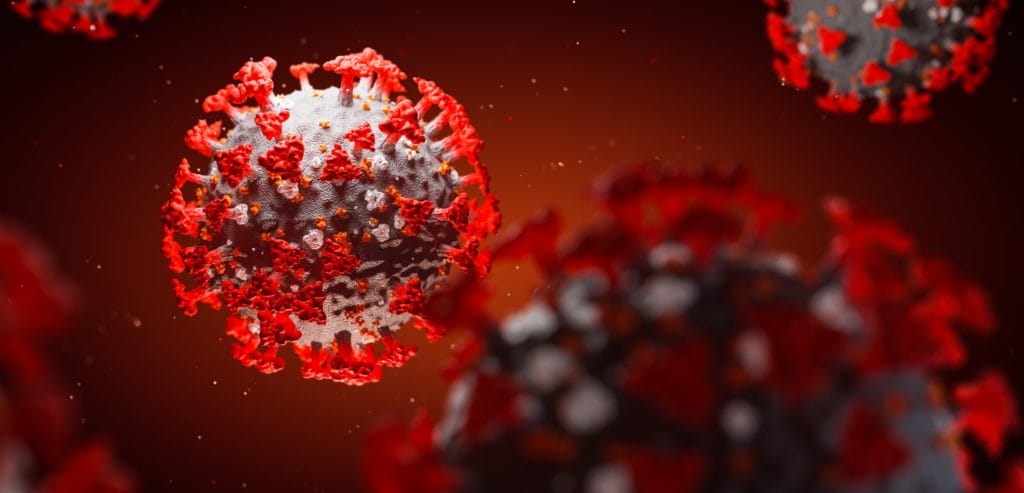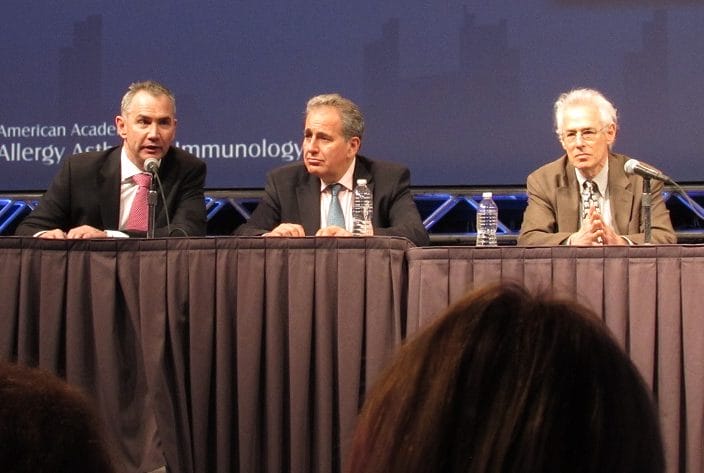
Updated May 1 – As the coronavirus spreads throughout the United States and the world, physicians are fielding calls from people with asthma. They are worried about being at heightened risk for severe illness.
The U.S. Centers for Disease Control and Prevention has listed asthma as one of the chronic illnesses that may increase the chance of a severe case of COVID-19. But what exactly are the coronavirus risks with asthma, and what can you do minimize them? And what should you do if you suspect that you or a family member with asthma may have picked up the virus?
Allergic Living reached out to two experts to learn about the risks and management strategies for this coronavirus with asthma.
Allergist and immunologist Dr. James Baker explains first that “people with asthma are generally not at a higher risk of becoming infected.” The trouble may come if they do contract the coronavirus.
“People with asthma or with any chronic lung disease have an increased risk of a more serious case if they get infected with COVID-19,” says Baker, a professor of medicine and the director of the Mary H. Weiser Food Allergy Center at University of Michigan.
Can Make Pneumonia Worse
For instance, “if they develop pneumonia and they have underlying asthma and bronchial airway inflammation, this can make the pneumonia more serious,” he says.
Yet much is still unknown about how easily the COVID-19 infection spreads, its severity and its impact on people with asthma specifically. Viruses, and respiratory viruses in particular, are a well-known cause of asthma flares. But “the small studies published so far have not come to a consensus on whether patients with asthma who get COVID-19 have a different course with the infection,” Baker says.

Dr. Brian Schroer, director of allergy and immunology at Akron Children’s Hospital in Ohio, also notes the lack of research to date. “We don’t really know how much more susceptible people with asthma are to having complications.” At this time, there is no data to say how much more likely a person with asthma is to develop pneumonia due to coronavirus, or how much more likely a person with asthma is to develop severe complications or not recover as easily.
Since many people who get COVID-19 do not have to go to the hospital or are not tested for the virus, Baker says it is difficult to determine the course of the illness in groups such as people with asthma. “With COVID-19 and asthmatics, there are lots of unknowns at this point,” he says.
Controlling Asthma Now
But here’s what the two experts are certain of: The benefits of being proactive with asthma. One of the best things people with asthma can do right now is to make sure that their asthma is as well controlled as possible, Schroer says. This includes staying on all of your current medications, or contacting your doctor to make adjustments if you think you could be doing better.
“Let’s say you are at 80%, but you could be at 100%,” he said. “Contact your doctor. Make sure you’re on the optimal medications and you’re taking them correctly.”
Baker says the focus should be on asthma control, as well as following the CDC’s coronavirus guidelines to protect yourself and family members. This includes frequent handwashing, avoiding face touching, social distancing and avoiding large crowds. “Be extra vigilant to not get infected and to follow your asthma treatment plan,” he says.
If you do become infected with coronavirus, having good asthma control means you may be less likely to have to deal with an asthma exacerbation on top of it.
“Prevention and management of your asthma before you get sick are the two best things you can do,” says Schroer. “Getting your asthma under control before something worse hits you will be very helpful. Even if you don’t get coronavirus, it will make you feel better because your asthma is better controlled.”
COVID-19 Preparations With Asthma
To be prepared in this time of epidemic, Baker stresses making sure you or your child with asthma have adequate supplies of any medications taken daily. What’s ideal is to have a couple of months of medication in reserve.
People with asthma should have an Asthma Action Plan and be using their peak flow meter to monitor pulmonary function. The action plan establishes a protocol to follow to increase medication levels in case of exposure risks or emerging symptoms.
If you don’t have an action plan, now is the time to get one.

“The most important thing is that your asthma is well-controlled, your pulmonary function is good and you have good reserve lung capacity,” says Baker. Then, “if you get infected, you will be able to deal with it.”
As of April 3, the CDC began recommending that people wear cloth masks in public settings such as stores, since it emerged that people who have contracted coronavirus, but aren’t yet showing symptoms, can spread the disease. The agency gave the examples of “speaking, coughing, or sneezing” in close proximity, as methods of spreading the disease.
Baker says wearing a cloth mask or a disposable N95 mask mainly protects others against what you breathe out. “These masks leak around the edges and don’t lock the valve of transmission, which is touching your face or your mouth with your hands,” he says.
Masks are a must for those who do have the virus. “For patients already infected, a mask can knock down the large droplets that they cough out,” notes Baker.
Coronavirus and Sensitive Lungs
Severe complications from COVID-19 appear to be largely due to pneumonia, which occurs when an infection, such as a virus, inflames the air sacs in the lungs. Pneumonia can be mild or severe.
Asthma, meanwhile, is a chronic disease that affects the bronchial tubes of the airways, causing them to constrict, inflame and produce extra mucus during an exacerbation.
Any illness that affects the upper respiratory system – whether it’s other coronaviruses that have long circulated throughout the world, the rhinovirus behind the common cold, or influenza – can cause asthma to flare. Asthma exacerbations include symptoms such as coughing, chest tightening, wheezing and shortness of breath.
Short of Breath: Asthma or COVID-19?
Both physicians say to contact your doctor if symptoms suggest the possibility of COVID-19 – from a fever and shortness of breath to coughing.
Tree pollen and grass pollen allergy seasons have arrived, and can lead to asthma symptoms such as respiratory issues. But a major difference in symptoms is that, with allergic asthma, you won’t get the fever that’s common to coronavirus. Schroer notes that “patients typically know what their asthma symptoms are.” Coronavirus is also associated with chills, muscle aches, headache and fatigue.
“If there is a concern that what you have is more than a cold – for example, if you have a high fever or any respiratory problem that seems out of the ordinary – contact your physician to be evaluated,” says Baker. Your healthcare provider may recommend that you increase the dosages of your asthma medications, or arrange for you to be tested.
Schroer says that with asthma, “if you have any concerns about your symptoms, absolutely contact your physician,” and many allergists are providing telemedicine. “If you feel like you can’t breathe, you can’t lie down, you can’t sleep and your inhalers aren’t working, you have to be seen by somebody,” he says.
Whether that means going to your allergist, pulmonologist or straight to the emergency department will differ depending on your local healthcare system.
Concerns Raised About Asthma Meds
Patients are asking allergists and pulmonologists whether certain medications used to treat asthma, such as oral corticosteroids and biologic drugs, could raise the risk of coronavirus complications.
The concerns relate to whether the asthma medicines might suppress immune system function.
The American College of Allergy, Asthma and Immunology says none of the asthma medications, including inhaled and oral corticosteroids and biologic medicines, have been shown to make COVID-19 illness worse. Nor do they increase the risk of getting the virus.
Baker cautions that with the risk of asthma exacerbations, “don’t change your medicines unless you talk to your physician.”
If a person has a respiratory illness and is experiencing asthma symptoms, Schroer notes how important it is to treat the asthma. “If you have an asthma attack due to inflammation from the virus, those patients probably should still get oral steroids, just like they would if they got influenza or any respiratory illness,” he says.
There is also no reason to stop biologics, Baker adds. The biologics used to treat asthma do not have the same immuno-suppressing effects like biologics used to treat other types of illnesses. Asthma biologics include: omalizumab (Xolair), reslizumab (Cinqair), dupilumab (Dupixent), mepolizumab (Nucala) and benralizumab (Fasenra).
“If you are on a biological, it is altering your immune system. But there is no evidence right now there is an increased risk for contracting COVID-19 or having a serious course of the illness,” Baker says.
Inhaled Steroids: Can They Add Protection?
Some patients who only use inhaled corticosteroids on a seasonal basis or alongside colds have been asking if they should start the inhalers preemptively. These drugs include beclometasone (Qvar), budensonide (Pulmicort), fluticasone (Flovent), etc.
“We have been getting questions about whether the inhaled steroids are helpful at preventing coronavirus complications, and we don’t know that specific answer,” Schroer said. “Inhaled steroids are often very helpful at decreasing asthma symptoms, but we don’t know whether you should start an inhaled steroid now if you are not experiencing asthma symptoms.”
Risks for Kids vs. Adults with Asthma
Lots of kids have asthma, but Schroer says that in what we’ve seen of COVID-19 so far worldwide, children seem to be avoiding the most serious complications from coronavirus. “The biggest risk factor for developing pneumonia from COVID-19 is age,” he says.
According to the CDC, children with COVID-19 have generally had mild, cold-like symptoms, such as fever, runny nose, cough, and potentially vomiting and diarrhea.
With asthma, control at any age is key. But older adults with asthma are advised to take especially rigorous precautions, says Baker.
Across the world, the odds of becoming seriously ill or dying from COVID-19 increase considerably with age. Most of the deaths have been in people older than 60, especially those with chronic conditions such as cardiovascular disease. The largest study to date of the disease, conducted in China, found that nearly 15% of people aged 80 and older died, compared to 1.3% of patients in their 50s.
“If you are in the over-60 range, I would be over-cautious when it comes to social distancing staying away from crowds for these next few months until we have a better feel for what is going to happen,” Schroer says.
Other Allergy-Related Care
If you have seasonal or perennial allergies, Schroer advises continuing to take nasal sprays and antihistamines, as your physician has recommended. Since a lot of people with allergies have eczema, the doctor also reminds to moisturize those over-washed hands regularly and avoid flare-ups.
Related Reading:
Allergic Living’s COVID-19 & Allergies, Asthma Resources Hub
Albuterol Shortage: 6 Strategies for Asthma Patients
Asthma Patients Alert: Shortage of Albuterol Announced
Dr. James Baker’s new blog: Pandemic Pondering
AAFA article has avoidance measures, more on symptom differences.
CDC guidelines on protecting yourself.
My Allergist’s Office Has Closed Due to Coronavirus: What If I Need Help?





